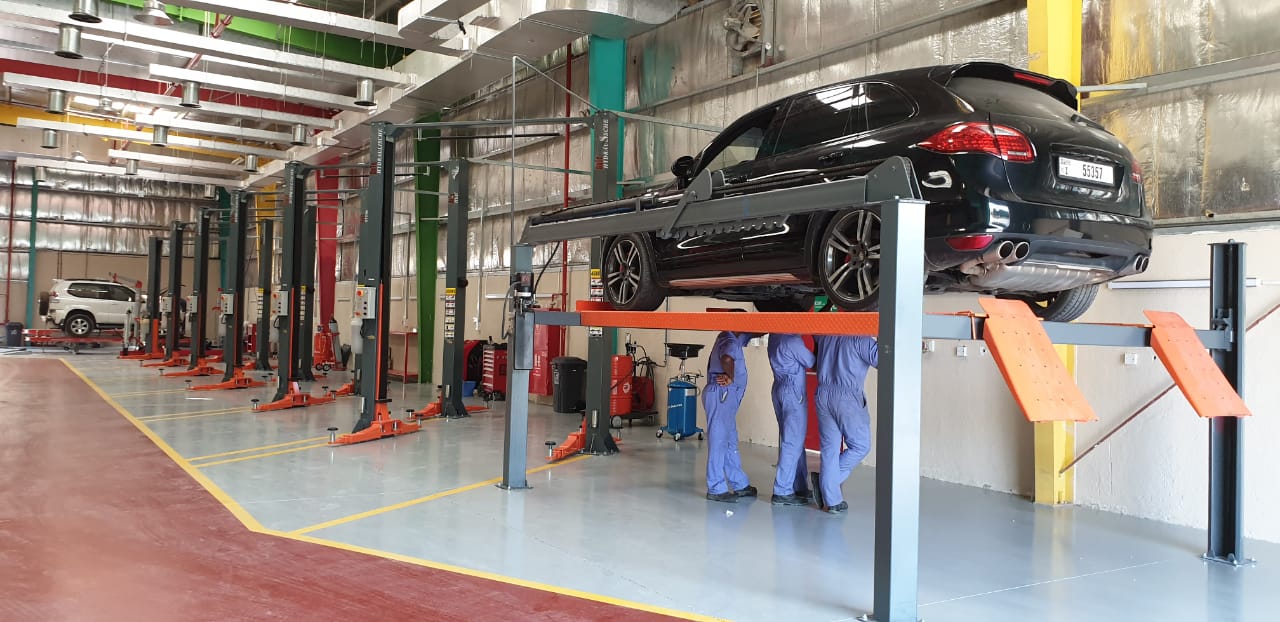Finding Auto Electrical Repair Shops Near Me: A Complete Guide
Your car’s electrical system is its central nervous system. When something goes wrong, it can feel like the entire vehicle is shutting down. From a dead battery to flickering lights or a car that won’t start, electrical issues are frustrating and often complex. This is where finding reliable auto electrical repair shops near me becomes crucial. You need a specialist who can accurately diagnose the problem and fix it correctly the first time. This guide will walk you through everything you need to know, from identifying common electrical problems to vetting the right professionals for the job, ensuring you get back on the road safely and without breaking the bank.
Key Takeaways
- Symptoms are Clues: Pay attention to signs like dimming headlights, slow engine crank, a battery light on the dash, or the smell of burning plastic. These are all indicators that you need to search for professional auto electrical repair shops near me.
- Diagnostics are Non-Negotiable: Modern vehicles are incredibly complex. Proper diagnosis requires specialized tools and expertise. Always choose a shop that starts with a thorough diagnostic process rather than just guessing and replacing parts.
- Certifications Matter: Look for shops with technicians certified by the National Institute for Automotive Service Excellence (ASE), particularly in Electrical/Electronic Systems (A6). This certification is a strong indicator of their knowledge and skill.
- Don’t Just Focus on Price: While cost is important, the cheapest option isn’t always the best. A lowball estimate might lead to subpar work or the use of inferior parts, costing you more in the long run. Focus on value, expertise, and the shop’s warranty policy.
- Ask the Right Questions: Before committing to a repair, ask about the diagnostic process, the specific parts they will use (OEM vs. aftermarket), the timeline for the repair, and the details of their warranty on both parts and labor.
Understanding Your Car’s Electrical System
Before you can effectively search for auto electrical repair shops near me, it helps to have a basic understanding of what you’re dealing with. Your vehicle’s electrical system is a vast and intricate network responsible for starting the engine, powering your lights, running the infotainment system, and managing countless sensors that keep your car operating efficiently and safely. The core components include the battery, which provides the initial power; the alternator, which recharges the battery and powers the electronics while the engine is running; and the starter, which turns the engine over. Beyond these “big three,” a labyrinth of wires, fuses, relays, switches, and computer modules—like the Engine Control Unit (ECU)—controls everything from your power windows to your anti-lock brakes. When one part of this system fails, it can create a domino effect, making diagnosis a real challenge for anyone without specialized training.
Common Electrical Issues You Might Face
Recognizing the symptoms of an electrical problem is the first step toward getting it fixed. While some issues are minor, others can leave you stranded or even pose a safety risk. A frequent culprit is a failing battery. You might notice the engine cranks slowly or not at all, or your interior lights are dim. Another common issue involves the alternator. If it’s going bad, your battery won’t charge properly, often triggering the battery warning light on your dashboard. You might also see your headlights flicker or dim while driving. The starter can also fail, resulting in a clicking sound or no sound at all when you turn the key. Blown fuses are simpler problems, typically causing a specific function like your radio or power outlets to stop working. More complex issues can involve faulty wiring, which can cause shorts and intermittent problems, or failing sensors, which can affect engine performance and fuel economy. These signs tell you it’s time to find a qualified technician.
The Importance of Specialized Diagnostic Tools
In the past, automotive electrical troubleshooting often involved a simple test light and a lot of guesswork. Today, that approach is obsolete. Modern cars are packed with advanced electronics and multiple computer networks that communicate with each other. To pinpoint an electrical issue accurately, technicians need sophisticated diagnostic scan tools that can read fault codes, access live data streams from various modules, and perform functional tests. When you’re looking for auto electrical repair shops near me, one of the most important questions to ask is about their diagnostic equipment. A reputable shop will have invested heavily in manufacturer-specific or high-end universal scan tools. These tools allow a technician to see exactly what a sensor is reporting, test the function of a specific switch, or identify a communication breakdown between modules. Without this technology, a mechanic is essentially flying blind, which can lead to misdiagnosis, unnecessary parts replacement, and a much higher final bill for you.
What to Expect During a Diagnostic Check
When you take your car to a shop for an electrical issue, the diagnostic process should be methodical and transparent. It typically begins with a technician interviewing you about the symptoms. Be as specific as possible—when did the problem start? Does it happen only when the car is hot or cold? Do you hear any strange noises? Next, the technician will likely perform a visual inspection, looking for obvious issues like corroded battery terminals or frayed wires. After that, they will connect a professional scan tool to your car’s OBD-II port to retrieve any stored trouble codes. However, a code is just a starting point; it tells the technician which system is reporting a fault, not necessarily what part has failed. A good technician will use the code as a guide to perform further tests, such as checking circuits with a digital multimeter, using an oscilloscope to analyze sensor signals, or consulting wiring diagrams to trace the problem to its source. This detailed process ensures the root cause is found and fixed correctly.
How to Find Reputable Auto Electrical Repair Shops Near Me
Finding a trustworthy repair shop can feel daunting, but a systematic approach makes it manageable. Start with a simple online search for “auto electrical repair shops near me” and browse the initial results. But don’t stop there. Dive deeper by reading customer reviews on platforms like Google, Yelp, and the Better Business Bureau (BBB). Look for patterns in the feedback. Are customers consistently praising the shop’s honesty, communication, and quality of work? Or are there repeated complaints about high prices, slow service, or unresolved issues? Word-of-mouth recommendations are also invaluable. Ask friends, family, or coworkers if they have a trusted mechanic who specializes in electrical work. You can also check for shops that are part of reputable networks like AAA Approved Auto Repair, which have to meet strict standards for service and quality. Creating a short list of three to four potential shops allows you to do more in-depth research before making a final decision.
Key Factors for Evaluating a Repair Shop
Once you have a short list, it’s time to evaluate each shop more closely. First, look for certifications. A shop that employs ASE-certified technicians, especially those with an A6 (Electrical/Electronic Systems) certification, demonstrates a commitment to professional standards. Manufacturer-specific certifications are also a huge plus if you drive a particular brand like BMW, Honda, or Ford. Next, consider the shop’s experience and specialization. A general repair shop might be able to handle a simple battery replacement, but for complex wiring or module issues, a specialist is always better. Inquire about their warranty policy. A good shop will stand behind its work with a warranty that covers both parts and labor for a reasonable period, often 12 months or 12,000 miles, though some offer even longer terms. Finally, trust your gut. When you call or visit, are the staff professional, friendly, and willing to answer your questions? A shop that communicates clearly and treats you with respect is more likely to provide a positive experience.
Understanding Repair Estimates and Costs
Getting a repair estimate can be one of the most confusing parts of the process. An estimate for an electrical repair is often broken down into three main parts: diagnostic time, labor, and parts. Most shops charge a flat fee for the initial diagnostic service, which covers the technician’s time to troubleshoot the problem. This fee can range from $100 to $250, depending on the complexity of the issue and the shop’s labor rate. Once the problem is identified, the shop will provide an estimate for the full repair. The labor cost is calculated by multiplying the shop’s hourly rate by the standard “book time” for that specific repair. “Book time” is an industry-standard estimate of how long a job should take. The parts cost will vary significantly based on whether you choose Original Equipment Manufacturer (OEM) parts or aftermarket alternatives. OEM parts are made by your car’s manufacturer and are a perfect match, but they are more expensive. High-quality aftermarket parts can be a good, cost-effective alternative.
Regional Differences in Auto Electrical Repair Costs
Where you live in the United States can have a noticeable impact on how much you pay for auto electrical repairs. Labor rates are the primary driver of this variation. Shops located in major metropolitan areas with a high cost of living, such as New York City, San Francisco, or Boston, will naturally have higher hourly labor rates than shops in rural parts of the Midwest or the South. For example, a shop in a large city might charge $180 per hour, while a shop in a smaller town could be closer to $100 per hour. This difference can add up quickly on a complex repair that requires several hours of labor. The cost of parts generally remains more consistent across the country, but local availability and shipping costs can still play a role. When you’re budgeting for a repair, it’s wise to call a few local shops to get a sense of the prevailing diagnostic and labor rates in your specific area. This will help you determine if an estimate you receive is fair and competitive for your region.
Comparing Shop Attributes: A Quick Guide
Making a decision can be easier when you lay out the facts. Use this table as a reference when you are vetting potential auto electrical repair shops near me.
|
Factor |
Shop A (Dealership) |
Shop B (Independent Specialist) |
Shop C (General Repair Chain) |
|---|---|---|---|
|
Specialization |
Manufacturer-specific. Best for complex, brand-specific issues. |
High focus on electrical and diagnostics for various makes. |
General repairs; may outsource complex electrical work. |
|
Technician Certification |
Manufacturer-certified. Often ASE-certified as well. |
Typically holds advanced ASE certifications (A6, L1). |
ASE certification is common, but may lack advanced specialists. |
|
Typical Costs |
Highest. Premium for OEM parts and specialized knowledge. |
Moderate to High. Competitive labor rates, offers part options. |
Lowest to Moderate. Focuses on common, simpler repairs. |
|
Parts Used |
Primarily OEM (Original Equipment Manufacturer). |
Offers both OEM and high-quality aftermarket options. |
Primarily aftermarket parts to keep costs down. |
|
Warranty |
Strong warranty on parts and labor, often honored nationwide. |
Strong local warranty, typically 12-24 months. |
Standard warranty, may vary by location. |
|
Turnaround Time |
Can be longer due to high volume or parts ordering. |
Often faster for diagnostics; repair time depends on parts. |
Can be quick for simple jobs, longer for complex ones. |
ASE Certification and Why It Matters
When you see the blue and white ASE seal at a repair shop, it’s more than just a sticker—it’s a mark of quality and competence. The National Institute for Automotive Service Excellence (ASE) is an independent, non-profit organization that tests and certifies automotive professionals to improve the quality of vehicle repair. To become ASE-certified, technicians must have at least two years of hands-on experience and pass a challenging specialty exam. For your needs, the most relevant certification is ASE A6: Electrical/Electronic Systems. A technician with this credential has proven their expertise in diagnosing and repairing everything from batteries and starting systems to complex issues with body control modules and instrumentation. Certifications are not for life; technicians must re-test every five years to keep their credentials, ensuring they stay current with evolving vehicle technology. Choosing a shop that employs ASE-certified technicians provides peace of mind that your car is in the hands of a qualified professional.
The Value of Manufacturer-Specific Training
While ASE certification is an excellent benchmark for general competence, manufacturer-specific training takes expertise to the next level. Car manufacturers like Toyota, Ford, and Mercedes-Benz run their own intensive training and certification programs for technicians who work at their dealerships. These programs provide deep, model-specific knowledge that is often unavailable to the general public or independent shops. Technicians learn the unique quirks of their brand’s electrical architecture, gain proficiency with proprietary diagnostic software, and get access to exclusive technical service bulletins (TSBs) that detail known issues and fixes. If you own a newer or luxury vehicle with a particularly complex electrical system, or if you’re dealing with a strange, intermittent problem that other shops have failed to fix, taking it to a dealership or a brand-specialist independent shop can be a wise move. Their specialized training might be the key to a faster, more accurate diagnosis and repair, which is a critical consideration when searching for auto electrical repair shops near me.
DIY vs. Professional Electrical Repair
With countless tutorials available online, the temptation to tackle a car repair yourself is strong. For some simple electrical tasks, a DIY approach can be rewarding and save you money. For instance, replacing a blown fuse is straightforward—just locate the fuse box, identify the bad fuse, and swap it with a new one of the same amperage. Similarly, cleaning corroded battery terminals with a wire brush or replacing the battery itself are manageable jobs for many car owners with basic tools. However, the line between a simple DIY fix and a problem requiring professional help is thin. Anything involving the alternator, starter, or complex wiring should be approached with extreme caution. A mistake can easily damage sensitive electronic components, leading to a much more expensive repair bill than you would have originally faced. You could also create a fire hazard or deploy an airbag accidentally. A good rule of thumb is: if the job requires more than a basic wrench set or involves cutting and splicing wires, it’s best to call a professional.
Preparing Your Car for a Visit to the Shop
Once you’ve decided to seek professional help, a little preparation can make the entire process smoother and more efficient. Before you head to the shop, take a moment to write down a detailed description of the problem. Note what the symptoms are (e.g., “the car makes a fast clicking noise but won’t start”), when they occur (e.g., “only on cold mornings”), and any recent events that might be related (e.g., “the problem started after I got a jump start”). This information is incredibly valuable to the technician. Also, make sure to remove any personal valuables from your car. While theft is rare at reputable shops, it’s always better to be safe. Finally, ask the shop about their policies regarding drop-off and pick-up times. A little planning helps ensure the visit goes smoothly for both you and the service team. Being prepared shows respect for the technician’s time and helps them diagnose your vehicle’s issue more effectively.
Questions to Ask Your Auto Electrician

Empowering yourself with the right questions can make all the difference in your repair experience. Before you authorize any work, have a clear conversation with the service advisor or technician. Start by asking them to explain the diagnostic process and the initial fee. A great question is, “Will the diagnostic fee be applied toward the final repair cost if I approve the work?” Many shops do this. Once they’ve identified the problem, ask them to explain it in simple terms. You should understand what is broken, why it failed, and what it will take to fix it. Inquire about the parts they plan to use: “Will you be using OEM parts or aftermarket parts? If aftermarket, what brand are they?” For a deeper dive into topics like part quality, you might find resources like the articles on https://versaillesblog.com/ helpful for general automotive knowledge. Also, be sure to get a clear timeline: “When can I expect the repair to be completed?” Finally, and most importantly, ask about the warranty: “What is your warranty on this repair, and does it cover both parts and labor?”
Understanding Your Warranty
A warranty is your protection against a faulty part or a mistake in the repair process. It’s a promise from the repair shop that they stand behind their work. However, not all warranties are created equal, so it’s essential to understand the details before you pay the bill. Most reputable shops offer a warranty that covers both parts and labor for a specific period, typically 12 months or 12,000 miles, whichever comes first. Some top-tier independent shops and dealerships may offer longer warranties, such as 24 months/24,000 miles or even 36 months/36,000 miles. Be sure to clarify if the warranty is local or nationwide. A nationwide warranty is particularly valuable because if the repaired part fails while you’re on a road trip, you can get it fixed at a participating shop without paying out of pocket. Always get the warranty terms in writing on your final invoice. It should clearly state the duration, what is covered, and any exclusions. This document is your proof should you need to make a claim later on.
Frequently Asked Questions (FAQ)
1. How do I find the best auto electrical repair shops near me?
Finding the best auto electrical repair shops near me involves a multi-step process that goes beyond a simple search. Start by gathering recommendations from trusted sources like friends, family, and colleagues who have had positive experiences. Supplement this with online research using Google Maps, Yelp, and the Better Business Bureau. Pay close attention to recent, detailed reviews, looking for consistent themes of professionalism, fair pricing, and successful repairs. Prioritize shops that specialize in automotive electronics and employ ASE-certified technicians, particularly those with an A6 (Electrical/Electronic Systems) certification. Call your top three candidates and ask about their diagnostic process, labor rates, and warranty policies. A shop that is transparent, communicative, and willing to answer your questions thoroughly is likely a good choice. Avoid shops with an overwhelming number of negative reviews citing misdiagnosis or upselling.
2. What are the typical costs and timelines for auto electrical repairs?
The cost and timeline for an auto electrical repair can vary dramatically depending on the issue. A simple fix like replacing a battery might cost $150-$400 and take less than an hour. Diagnosing and replacing a faulty alternator could range from $400 to over $1,000 and take a few hours. More complex problems, such as tracing a parasitic drain or repairing a damaged wiring harness, can be very time-intensive. Most shops charge an initial diagnostic fee of $100-$250 to identify the problem. The total cost will then depend on the price of the necessary parts and the labor hours required for the fix. A complex diagnosis and repair involving a vehicle’s main computer (ECU) or a body control module could easily exceed $1,500 and may require the car to be at the shop for several days, especially if parts need to be ordered. Always get a detailed written estimate before authorizing any work.
3. How important is the diagnostic process, and what should I expect?
The diagnostic process is the single most critical part of any electrical repair. Modern cars have incredibly complex systems, and simply guessing at the problem by replacing parts is an expensive and ineffective strategy. A proper diagnosis saves you money and time. You should expect a reputable shop to begin with a thorough consultation about the symptoms you’re experiencing. A technician will then use advanced scan tools to communicate with your car’s computers and retrieve fault codes. However, these codes are just clues, not final answers. A skilled technician will then use tools like a digital multimeter or an oscilloscope to perform functional tests on circuits, sensors, and components to pinpoint the exact cause of the failure. This methodical approach ensures the correct part is replaced the first time. You should receive a clear explanation of their findings before any repair work begins.
4. What kind of warranty should I look for from an auto electrical shop?
A solid warranty is a key indicator of a shop’s confidence in its work. For auto electrical repairs, you should look for a warranty that covers both the parts replaced and the labor to install them. A standard, reputable warranty is typically 12 months or 12,000 miles. However, many top-quality independent shops and dealerships offer longer terms, such as 24 months/24,000 miles or even 36 months/36,000 miles. It’s also crucial to ask if the warranty is honored locally or nationwide. A nationwide warranty offers significant peace of mind, as it means you can get a covered repair fixed at an affiliated shop anywhere in the country. Always get the warranty details in writing on your final invoice. This document should clearly outline the coverage period, what is included, any exclusions, and the process for making a claim.
5. What are some red flags to watch out for when choosing a shop?
When evaluating potential auto electrical repair shops near me, there are several red flags to be aware of. Be cautious of any shop that offers to give you a price quote over the phone without first performing a proper diagnosis. It’s impossible to accurately estimate a complex electrical repair sight-unseen. Another major red flag is a disorganized or dirty service area, which can reflect a lack of professionalism and attention to detail. High-pressure sales tactics, such as trying to upsell you on a long list of “recommended” services before even addressing your primary concern, are also a warning sign. Vague answers to your questions about technician certifications, the diagnostic process, or warranty details should make you hesitate. Finally, consistently poor online reviews that mention unresolved issues, surprise charges, or rude customer service are clear indicators that you should take your business elsewhere.
6. Do mobile mechanics handle complex auto electrical repairs?
Mobile mechanics can be incredibly convenient for many routine maintenance and repair tasks, but their capabilities for complex auto electrical work can be limited. A mobile mechanic is well-equipped to handle common issues like battery testing and replacement, fixing a bad ground connection, or even replacing an alternator or starter in some cases. However, they may not have access to the full range of advanced diagnostic equipment, vehicle lifts, or specialized tools needed for more intricate problems. Diagnosing an intermittent wiring short or a failing control module often requires a controlled shop environment and equipment that isn’t practical for a mobile van. Before booking a mobile service for an electrical issue, be very specific about the symptoms and ask directly if they have the necessary diagnostic tools and experience for that type of job. For deep, complex electrical problems, a dedicated brick-and-mortar specialty shop is often the more reliable choice.
Conclusion
Navigating the world of automotive electrical repair doesn’t have to be overwhelming. By understanding the basics of your car’s electrical system, recognizing common symptoms, and knowing what to look for in a quality repair shop, you can approach the situation with confidence. The key is to prioritize expertise and transparency over the lowest price. A shop with certified technicians, modern diagnostic equipment, and a strong warranty is your best ally in resolving complex electrical issues correctly. Taking the time to research and vet local options, ask pointed questions, and understand your estimate will save you from future headaches and unnecessary expenses. When you find the right professional partner for your car’s needs, you are not just buying a repair; you are investing in safety, reliability, and peace of mind for the road ahead.














Post Comment